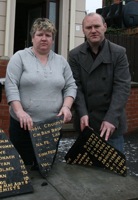
There are concerns that tensions between Sinn Féin and republican dissidents could escalate further.
Mutual denunciations over the Easter commemorative period have been followed by allegations that dissidents were behind attacks on Sinn Féin offices in Derry and Belfast. The allegations have since been denied.
Tensions escalated dramatically last month when Sinn Féin’s Martin McGuinness joined PSNI Chief Hugh Orde and DUP leader Peter Robinson to condemn as “traitors” the breakaway republican groups who had carried out deadly attacks on the British Crown forces.
In its Easter statement delivered on Monday, the ‘Real IRA’ hit back with a strong denunciation against Mr McGuinness, a former IRA leader.
“A former comrade has come full circle and, with a knight of the British realm at his shoulder, he has labelled our gallant volunteers as traitors,” the ‘Real IRA’ said.
“Let us remind our former comrade of the nature and the actions of a traitor.
“Treachery is collaborating with the enemy. Treachery is betraying your country.”
In the statement, the ‘Real IRA’ also said it was responsible for killing Sinn Féin leadership figure Denis Donaldson three years ago, after he publicly admitted that he had worked as an informer for 20 years.
“No traitor will escape justice, regardless of time, rank or past actions.
“The republican movement has a long memory.”
Sinn Féin accused dissidents of being “deluded” and warned that the ‘Real IRA’ statement carried an implied threat.
Party President Gerry Adams, addressing the annual Easter commemoration at the republican plot in west Belfast’s Milltown Cemetery, said that dissidents were “hijacking republicanism” and using it for their own interests.
A peaceful and democratic path to a united Ireland has been opened up, he said.
“I uphold the right of everyone to dissent from Sinn Féin’s point of view.
“But no one is entitled to hijack our proud republican history and our republican future, and abuse it for narrow, selfish interests or self-gain.”
“Sinn Féin, standing firmly on a republican platform, sets ourselves firmly against those elements who do this.”
The dissidents were blamed by Sinn Féin for an arson attack on a party office in Derry and a paint attack on the party’s west Belfast constituency office in Andersonstown.
A memorial to IRA Volunteers was smashed at Connolly House in the third such act of vandalism in recent weeks. The west Belfast constituency office is mainly used by Assembly members Paul Maskey and Sue Ramsey.
“This attack is the third in a very short period but it will not detract Sinn Féin from our work,” said Mr Maskey.
“It comes after an upsurge in anti-republican graffiti throughout parts of west Belfast.
“The attack on the Connolly House advice centre and, in particular, the desecration of the (IRA) Roll of Honour isn’t just an attack on Sinn Féin but an attack on our community.
“The people of west Belfast overwhelmingly support our political project, they have made that clear at elections but it was also made very clear when thousands upon thousands lined the Falls Road at this year’s Easter Parade.”
However, Gary Donnelly, a leading figure in the 32 County Sovereignty Movement, denied claims that dissidents were involved.
“Why would we destroy a memorial to IRA members?” Mr Donnelly asked.
“It would be counter-productive of us to attack Sinn Féin members when we are trying to win over the Provisionals’ support base.”
He said recent attacks were the work of “hoods” and vandals.
Mr Donnelly said this was accepted by all community leaders in nationalist and republican areas in Derry and Belfast.
Earlier this week, a ‘Real IRA’ spokesman denied suggestions that Sinn Féin rivals were being targeted by that organisation.
“Taking military action against Sinn Féin leaders who are British ministers, or who urge nationalists to inform on us, isn’t high on our agenda at the moment.
“However, that isn’t to say this position won’t change and, indeed change quickly, under certain circumstances.”
He said that the group’s current strategy is not to return to a sustained campaign of violence but to engage in “tactical use of armed struggle” against British rule.
![[Irish Republican News]](https://republican-news.org/graphics/title_gifs/rn.gif)
![[Irish Republican News]](https://republican-news.org/graphics/title_gifs/harp.gif)

